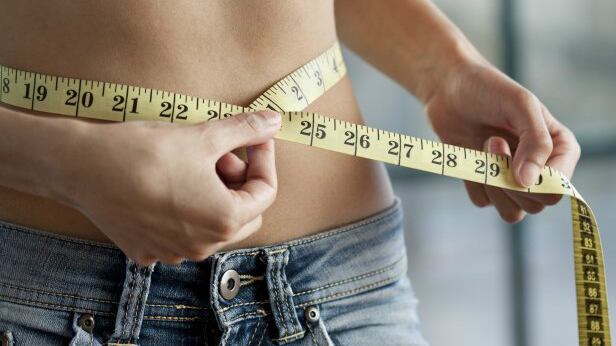When was the last time you saw a tabloid cover without a picture of Kim Kardashian’s post-pregnancy body?
Celebrities’ postpartum figures are a persistent narrative on newsstands and websites, confirming our perverse obsession with how much weight women put on during pregnancy—and how quickly they shed lumps and baby bumps after giving birth. Inundated with stories of famous new moms’ post-birth diet and exercise regimes, we alternately shudder and marvel at their results. When the 2012 Victoria’s Secret Fashion Show aired, we watched in awe—and squinted at our televisions for signs of stretch marks—when models Adriana Lima, Alessandra Ambrosio, and Lily Aldridge all walked the runway within months of giving birth.
These women are freaks of nature, we tell ourselves, finding some consolation in the idea of multiple hands on deck backstage painting concealer over stretch marks and spider veins (surely models get them during pregnancy, too). After the show ends and the following day’s media chatter subsides (“SEE Heidi Klum’s Toned, Post-Birth Tummy!”), we move on.
And yet when 26-year-old Norwegian fitness blogger Caroline Berg Eriksen Instagrammed a head-to-toe selfie in her skivvies four days after popping out a baby—complete with buoyant breasts, washboard abs, and that enviable thigh gap—the mommy blogosphere fulminated. Australia’s Mama Mia blogger Rebecca Sparrow declared Eriksen’s photo “an act of war AGAINST women.”
“This whole situation has become ludicrous,” Sparrow writes. “The competition for women to give birth and then immediately remove any trace from their bodies that they ever carried a child is OBSCENE. There is no other word for it. Actually, it’s more than obscene— this 'Look how hot I still am!' obsession and need for public endorsement is a disservice to all women.”
Fellow Norwegian blogger Suzanne Abel piqued the hysteria: “As a 32 year old with a 4 year old son... and according to BMI-halva ‘10 kg overweight’ I think: WHO ARE YOU POST THIS IMAGE?...What is the good purpose here? Why is this positive?”
Some of the issues Sparrow and Abel raise are fair—the “competition” to lose baby weight quickly, for instance, and whether or not Eriksen’s selfie sends a “positive” message—but what accounts for the rage? And what of their hypocrisy in criticizing Eriksen for making other women scrutinize their own postpartum figures while scrutinizing hers at the same time? “Glory to you Soccer Lady for you is [sic] really a separate breed,” Abel scoffs.
But both bloggers are missing the point: if we should celebrate all post-baby bodies, why can’t we celebrate Eriksen’s? Why can’t she proudly display her sculpted stomach on Instagram, even if most women look nothing like her immediately after giving birth?
Eriksen’s post-birth lingerie pic came weeks after fitness instructor Maria Kang’s contentious photo of herself in a bikini, surrounded by her three young sons with the caption, “What’s your excuse?” After posting the image on Facebook, Kang was accused of bullying, fat-shaming and setting unrealistic expectations for other pregnant and postpartum women.
Kang’s photo was not a de facto selfie, but it still contains the language of the selfie which, in this case, was particularly tone deaf. The image is particularly off-putting because Kang is a fitness instructor; she quite literally doesn’t have an excuse to not sweat herself back to her pre-pregnancy figure the minute her doctor gives the okay.
There’s a certain type of person who posts vainglorious images on social media—and a certain type of person who responds to them with self-righteous indignation. But why must mommy bloggers be so offended by plain old narcissism, especially in Eriksen’s case? Why do these critics internalize a sense of shame on behalf of all “ordinary” postpartum mothers? Sure, Eriksen’s and Kang’s photos are obnoxious, but isn’t this, to some extent, true of all selfies?
We’ve reached a point of selfie saturation—a solipsistic smartphone frenzy in which we can’t resist the urge to share photos of ourselves captured on every momentous and mundane occasion. If there’s one urge we should resist, it’s concluding that all selfies are a cry for approval. Even tedious, post-baby bikini photos can be a source of empowerment. But the needless politicizing of self-centeredness is as pointless as cataloging Kim Kardashian’s stretch marks.






